Jan Freund
Research interests
My overarching interest is the transfer of paradigmatic models and methods from the field of theoretical physics and complex systems to other scientific fields, such as marine biology, ecology or neuroscience. In addition to the possibility of tracing observable phenomena from the aforementioned neighbouring sciences back to fundamental principles and mechanisms, there is often also a practical benefit, such as the optimisation or control of processes through the elucidation and quantification of causal mechanisms of action. My repertoire of methods often includes a stochastic component, whether in model formulation through stochastic processes or in empirical data analysis through statistical concepts.
Ongoing projects
- GreenHAB: Risks of climate change driven Harmful Algal Blooms in Greenland waters -
indicators, tipping points and impacts on local ecosystem functioning and services.
Project duration 01.Sep.2023 to 31.Dec.2026 in the BMBF project network "Polar Regions in Transition".
- AGELESS: Leveraging long-term planktonic diversity data to develop a framework to assess and protect biodiversity in areas beyond national jurisdiction.
Project duration 01.Sep.2024 to 31.Aug.2027 as part of the BMBF Strategy for Research for Sustainability (FONA) on the topic "Blue Ocean - Development of recommendations for action to conserve and protect marine biodiversity".
Selected publications
- Luhede A, Freund JA, Dajka JC, Upmann T. The value of information in predicting harmful algal blooms. Journal of Environmental Management (2025) 373:123288.
doi.org/10.1016/j.jenvman.2024.123288
- Wiedemann C, Wächter M, Peinke J, Freund JA. Improved estimation of drift coefficients using optimal local bandwidths. Eur. Phys. J. B (2024) 97:48.
doi.org/10.1140/epjb/s10051-024-00686-4
- Gault JA, Freund JA, Hillebrand H, Gross T. Dissimilarity analysis based on diffusion maps. Oikos (2023) 12:1-12.
doi.org/10.1111/oik.10249
- Merder J, Röder H, Dittmar T, Feudel U, Freund JA, Gerdts G, Kraberg A, Niggemann J. Dissolved organic compounds with synchronous dynamics share chemical properties and origin. Limnol. Oceanogr. (2021) 66:4001-4016.
doi.org/10.1002/lno.11938
- Hillebrand H, Donohue I, Harpole WS, Hodapp D, Kucera M, Lewandowska AM, Merder J, Montoya JM, Freund JA. Thresholds for ecological responses to global change do not emerge from empirical data. Nature Ecology & Evolution (2020) 4 (11), pp.1502-1509.
doi.org/10.1038/s41559-020-1256-9
- Merder J, Freund JA, Feudel U, Hansen CT, Hawkes JA, Jacob B, Klaproth K, Niggemann J, Noriega-Ortega BE, Osterholz H, Rossel PE, Seidel M, Singer G, Stubbins A, Waska H, Dittmar T. ICBM-OCEAN: Processing Ultrahigh-Resolution Mass Spectrometry Data of Complex Molecular Mixtures. Analytical Chemistry (2020) 92 (10), pp.6832-6838.
doi: 10.1021/acs.analchem.9b05659
- Lewandowska AM, Jonkers L, Auel H, Freund JA, Hagen W, Kucera M, Hillebrand H. Scale dependence of temporal biodiversity change in modern and fossil marine plankton. Global Ecology and Biogeography (2020) 29 (6), pp.1008-1019.
doi: 10.1111/geb.13078
- Freund JA, Mieruch S, Scholze B, Wiltshire K, Feudel, U. Bloom dynamics in a seasonally forced phytoplankton-zooplankton model: Trigger mechanisms and timing effects. Ecological Complexity (2006) 3 (2), pp.129-139.
doi.org/10.1016/j.ecocom.2005.11.001
- Freund JA, Schimansky-Geier L, Hänggi P. Frequency and phase synchronisation in stochastic systems. Chaos: An Interdisciplinary Journal of Nonlinear Science (2003) 13 (1), pp.225-238.
doi.org/10.1063/1.1500497
Teaching
Winter semester
Statistical Ecology
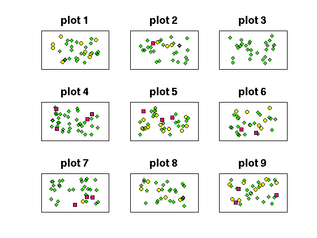 Type of course: VL & UE SWS: 2 & 2
Type of course: VL & UE SWS: 2 & 2
ECTS: 6
Target group: Environmental modellers (M.Sc.)
Content:
- Basic concepts and introduction
- Random variables and probability distributions
- Estimation of population proportions
- Estimation of population densities
- Statistical description of communities
Population dynamics
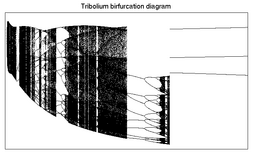 together with Ulrike Feudel
together with Ulrike Feudel
Type of course: VL & UE SWS: 2 & 2
ECTS: 6
Target group: Environmental modellers (M.Sc.)
Content:
- Growth dynamics of individual species in continuous (flow) and discrete (maps) time.
- Dynamics of interacting populations (competition and predator-prey models, trophic networks)
- Matrix models for age- and stage-structured populations
- Non-linear matrix models and populations in space
- Stochastic population dynamics
Summer semester
Stochastic processes
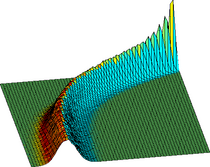 Type of course: VL & UE SWS: 2 & 2
Type of course: VL & UE SWS: 2 & 2
ECTS: 6
Target group: Environmental modellers (M.Sc.)
Content:
- Basic concepts of stochastics
- Characterisation of stochastic processes
- Fundamental equations for the ensemble description of stochastic processes
- Stochastic differential equations for the description and simulation of realisations of stochastic processes
- Applications: Random motion, stochastic neuron models, stochastic population dynamics.
Time series analysis
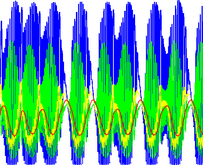 Type of course: VL & UE SWS: 2 & 2
Type of course: VL & UE SWS: 2 & 2
ECTS: 6
Target group: Environmental modellers (M.Sc.)
Content:
- Time series as realisations of stochastic processes
- Process variables and their estimators
- Component models: trends, rhythms and residuals
- Spectral characterisation of time series
- Non-stationary processes: Time-frequency methods
- Linear filters and discrete-time linear stochastic processes
- Non-linear processes: State space and attractor
- Embedding theorem, reconstructed attractor and invariants
- Lyapunov exponents
- Generalised dimensions
Applied Statistics
together with Helmut Hillebrand, Michael Winklhofer, Gerhard Zotz
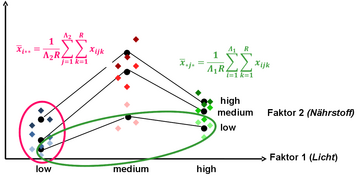
Type of course: VL & UE SWS: 2 & 2
ECTS: 6
Target group: Environmental scientists (B.Sc.)
& Biologists (B.Sc.)
Content:
- Why statistics at all?
- Random variables, distributions, position and shape parameters
- Empirical parameters, estimators, robustness
- Covariance and correlations
- Statistical tests, null hypothesis, errors of 1st & 2nd kind
- t-test, ANOVA, Kruskal-Wallis
- Post-hoc tests, multiple testing
- Regression
- ANCOVA
- Supplements (pseudo-random numbers, transformations, resampling techniques)
The lectures are supplemented and deepened by practical work with data in the programming environment R. An introduction to R is given in the first exercises. Homework will be set and assessed - only a sufficient performance here entitles the student to take the exam.

![[Translate to English:]](/f/5/_processed_/3/2/csm_ICBM-Logo-transparent-_91fe1c6774.png)
